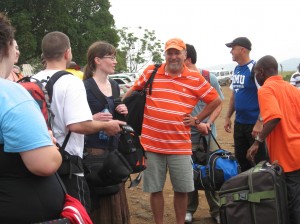“There is surely a future hope for you, and your hope will not be cut off” (Proverbs 23:17).
This is the verse that marks the entrance of the Jones Clinic and VCT which serves HIV/AIDS patients in Kisumu, Kenya. I didn’t put it there. I assume the director, K’Otieno Thomas picked it out. But I like it. I think it fits. On my second day in Kenya, I was going to preach to a bunch of people in the Nyalenda slum. I thought this might be just the right text.
“Hope” was the theme of my message. I explained that hope meant a joyful anticipation of the future. It means that when you look forward to what lies before you, you are optimistic. It seemed like a good message. But it was a pretty tough one—especially for who showed up to hear it.
At one point in the gathering, K’Otieno decided to welcome guests. He introduced all of us who were American visitors and thanked us for being there. He then proceeded to ask other groups to stand and be recognized. And then the last group mentioned was a group of people in the community who had AIDS and come to the clinic to receive help. And they stood up, and we clapped like we did for every other group. I couldn’t believe how many stood up. It looked like 25% of the people who had gathered—at least in my section. K’Otieno then thanked them for being there and not feeling stigmatized like others might want them to feel. He expressed how they were loved by God just as much as any other group there.
And then I wondered about the message I had just delivered. Did they have hope? Did the message give them any hope? I explained that we lose hope because of our problems. Then, my explanation told about how we further lose hope when we think that we don’t have any power over our problems. Next, I tried to tell how there is a power from God that is greater than our problems. When we think our problems are greater than that power, we lose hope. If we think that power is greater than our problems, we have hope. But I wondered if they thought there was a power greater than their problem. And when they looked ahead at their situation, did they really have joy?
My standard message when talking to people who have AIDS here is that there is no cure for AIDS, but there is a cure for death. This is true, and it does give a joyful hope for the future. But there was one woman who set me back a bit. She thanked me for telling her this viewpoint. In fact, she told me that she believed it. But she added, “I know how to die—I just don’t know how to live.” She thanked me for giving her a message. But she said that she wished I would have given her food. She knew about Jesus. She was always glad to hear more about Him. But she already had that message down. She was already saved for eternity. She simply didn’t have anything to eat today. She had hope for the long haul but not much for the day.
I want to keep preaching. I believe in a heaven. But I don’t think I can let heaven be an excuse for escaping charity in the present. I must live my life to not only bring hope for the eternity but also hope for the moment. And the good news is that she did get some food that day.


